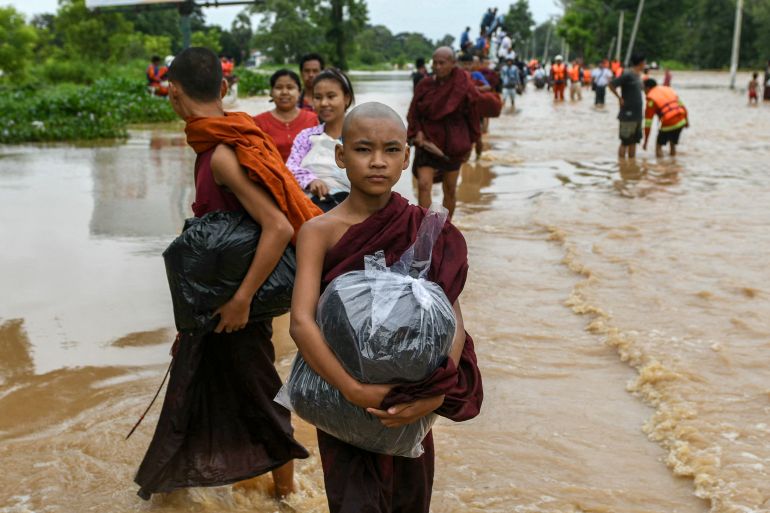UNICEF says six million children in Southeast Asia affected by Typhoon Yagi
UN’s children’s agency says there’s an urgent need for access to clean water, sanitation as Red Cross mobilises relief.
Vast tracts of land in Myanmar have been submerged by floods [Sai Aung Main/AFP]Published On 18 Sep 202418 Sep 2024
Massive floods and landslides triggered by Typhoon Yagi have left nearly six million children across Southeast Asia struggling to access clean water, food, and shelter, according to the United Nations children’s agency.
The most powerful storm to hit the region this year, Yagi struck the Philippines in early September before wreaking havoc across Vietnam, Thailand, Laos and Myanmar.
More than 500 people have been killed – nearly 300 in Vietnam, dozens in Thailand and at least 236 in Myanmar. Millions of people there have already been displaced by war.
“The most vulnerable children and families are facing the most devastating consequences of the destruction left behind by Typhoon Yagi,” June Kunugi, UNICEF regional director for East Asia and Pacific, said in a statement on Wednesday. “The immediate priority must be to restore the essential services that children and families so critically depend on, including clean water, education, and healthcare. The surge in extreme weather events in Southeast Asia, exacerbated by climate change, is a sad reminder that when disasters hit, vulnerable children often pay the highest price.”
The UN humanitarian affairs agency has said there is an urgent need for food, drinking water, medicine, clothes and shelter for those affected by the floods.
On Wednesday, the International Federation of the Red Cross (IFRC) made emergency appeals for Vietnam and Myanmar totalling 6.5 million Swiss francs ($7.69m).
“This year alone, the Asia Pacific region has faced an unrelenting series of climate-related disasters,” IFRC’s regional director for Asia Pacific, Alexander Matheou, said in a statement. “The devastation caused by Super Typhoon Yagi is just the latest example of the compounding effects of the climate crisis on people who are already in vulnerable situations. From typhoons, floods, and heatwaves to droughts, these crises hit one after another, leaving little room for recovery.”
People in Myanmar’s Bago region queue for food at a relief centre set up inside a monastery [Sai Aung Main/AFP]
UNICEF said it had confirmed damage to more than 850 schools and at least 550 health centres as a result of the typhoon, most of them in Vietnam. Assessments of the situation were continuing, it added.
It said in Vietnam about three million people, including many children, were at heightened risk of disease because the typhoon had cut off access to safe drinking water and sanitation. Some two million children had also been left without access to education, psychosocial support, and school feeding programmes.
Tens of thousands of children were affected in northern Thailand and Laos, it added.
“In Myanmar, the double burden of ongoing conflict and the catastrophic impacts of Typhoon Yagi has intensified the crisis for communities already displaced by conflict, worsening an already dire humanitarian situation,” it said, noting 320,000 people had suffered displacement as a result of the floods.
Senior General Min Aung Hlaing, who seized power in Myanmar in a February 2021 coup, has appealed for international assistance to tackle the disaster, although the military regime has previously rejected or obstructed relief efforts, including after Cyclone Mocha last year.
